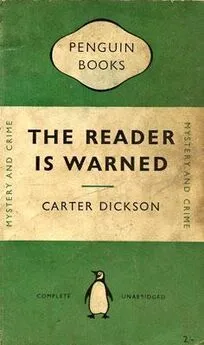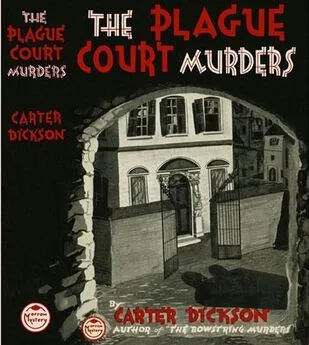John Carr - The Reader Is Warned
- Название:The Reader Is Warned
- Автор:
- Жанр:
- Издательство:неизвестно
- Год:неизвестен
- ISBN:нет данных
- Рейтинг:
- Избранное:Добавить в избранное
-
Отзывы:
-
Ваша оценка:
John Carr - The Reader Is Warned краткое содержание
Another of Carr's mysteries with a strong gothic touch, this one involving a psychic.
_________________
The Reader Is Warned - читать онлайн бесплатно полную версию (весь текст целиком)
Интервал:
Закладка:
'At about two minutes to eight Constable called out to his wife, through open doors between, that he had finished dressing and was going downstairs. Just as she heard his door close into the hall, she remembered that she had forgotten to ask whether she had given him two clean handkerchiefs. She went over and opened her door into the hall.
'Both their rooms face across towards the third side of the square - formed by the side of the staircase, with a hand-rail. Mrs Constable saw her husband standing in the hall with his back to her. Not standing, exactly. She described him as "dancing and staggering".
Masters had taken out his notebook, which he spread flat on the table. His hard eye was speculative. He seemed to sense that something was going on under the surface, but could not quite catch what.
He cleared his throat.
' "Dancing and staggering?" Oh, ah. Just what did she mean by that?' 'She couldn't or wouldn't be clearer.' 'Yes, sir. Go on.'
'He pitched forward across the hand-rail guarding the stairs, and she began to scream. I was out in the hall within a couple of seconds after she started to scream. Constable was writhing across the hand-rail; he was twitching his left hand in the air - so - and seemed to be trying to push himself over. He fell down beside the rail instead, and died a few seconds after I reached him.'
'Of what, sir?' asked the chief inspector sharply.
'I thought at first it was rupture of the heart. Everything was characteristic: sudden pain, collapse, cramps, extremities cool and damp. And earlier in the evening he had mentioned a "seizure" as though he were afraid of one. But I didn't like the dilation of the eye-pupils. I tried to question Mrs Constable about his heart. But she was in no condition to be questioned about anything. That was the situation - a simple situation, you'll admit - until I talked to Dr Edge, Mr Constable's own doctor.'
'Just so. Well?'
'His heart was as sound as yours or mine. The man was a hypochondriac, that's all. And worse. At the post-mortem we found every organ healthy: there was nothing whatever to show what had caused his death.'
'But you will find it? Eh, Doctor?'
‘I don't understand you.'
'We-el, now!' said Masters, pursing up his lips and making noises of broad scepticism. He was indulgent. 'It may look bad, I admit; but I don't see much to get the wind up about. Doctors are always going on like that. Arguments about what caused death-'
'I am telling you that there was nothing to show what caused his death. When the house falls on your head you'll understand why that is so important. And doctors do not "go on like that".'
‘What would you say to poison, now?' suggested Masters, with the air of one making a fair business proposition.
‘No.'
‘Oh, ah? Sure?'
‘Yes. Unless you're giving me "mysterious poisons unknown to science," which I won't swallow.' In spite of himself Sanders grinned. 'Inspector, I'll stake my reputation (such as it is) that Constable didn't die of any kind of poison, solid, liquid, or gaseous. Dr Edge and I have been at it until we're half blind, and if there's any test we've omitted I should be interested to hear about it. It won't do.'
The chief inspector scratched the side of his jaw. He had begun to look suspicious, a sign that he was disturbed.
'Then there's something wrong,' he declared. 'Eh? After all, you know, something killed the chap. That's to say, a man can't just drop over dead without there being any sign of what killed him.'
'Oh yes, he can,' said Sanders.
'Sir?'
'On the contrary, I can tell you at least three ways in which a completely sound and healthy person can die without any sign, internal or external, to show what killed him.'
'But that won't do!'
‘Why not?'
'Because - well, lummy!' exploded Masters, making a broad gesture. He got up and stared out of the bright window, jingling coins in his pocket. 'That'd put us in a bit of a hole, wouldn't it? I ask you, where would the police be if people started dying all over the place and not a blinking thing to show what polished 'em off?'
‘Ah, now we're getting closer to the difficulty. We haven't quite hit it yet, but we're closer. I've copied out a statement here which you can hand over to the Press if things get too hot. It isn't my statement, by the way, and it will carry a good deal of authority. It's a quotation from Taylor,’ so you can believe it.'
He unfolded a sheet of paper covered with his own careful handwriting.
‘ * "Among non-professional persons a prejudice exists that no person can die from violence unless there be some distinctly mortal injury inflicted on the body - i.e., a visible mechanical injury to some organ or blood-vessel important to life. This is an erroneous notion, since death may take place from the disturbance of the functions of an organ important to life without this being necessarily accompanied by a perceptible alteration of structure".'
He pushed the paper across the table.
‘There you have it, short and sweet. I repeat that I can tell you at least three ways in which a person can die by violence without any sign, internal or external, to show what killed him.'
Masters was after this like a terrier.
'Oh, ah? You say "violence". You mean - murder?'
‘Yes.'
'I see,' muttered the chief inspector, after a pause. He sat down and squared himself. 'I don't mind admitting I'm learning things every minute. Only, whenever I talk to you
*‘Taylor's Principles and Practice of Medical Jurisprudence, Seventh Edition, 1930. (London: J. & A. Churchill, 7 Great Marlborough Street.)
f Taylor, vol. 1, p. 381.
or Sir Henry Merrivale, they're always things I wish weren't so. Three ways, eh? All right, Doctor: let's have 'em.'
'First. People have been known to be killed very quickly as the result of an unexpected blow on the upper part of the abdomen or on the pit of the stomach. It acts on the nerves or nerve-ganglia. Yet there has been no mark of a bruise externally, or any physical injury internally, to account for death.'
'Stop a bit,' said Masters, sitting up. 'You don't mean you could give somebody an unexpected wallop in the breadbasket and kill him ?'
'Well, I shouldn't rely on it as a never-failing method of murder. You might kill him; and then again you mightn't. My point is that it has been known to happen. If you did that without witnesses, and the victim died, there would be nothing on earth to tell what had killed him.'
'Is that so, now?' Masters ruminated. 'Go on. What's the second way?' -
'Second. People have died without mark from concussion of the brain. A man gets a severe blow on the head; he falls down dead on the spot or later died unconscious. There may be a slight abrasion of the scalp. There may be no abrasion of the scalp at all; in the brain there may be no laceration or rupture of the blood-vessels, and all the other organs are healthy. Yet the man has died of violence.'
‘H'm. Third way?'
'Third. Nervous shock, caused by surprise or fright. Usually ascribed to vague inhibition of the heart. Don't snort: it's a solid fact and a solid scientific force which can knock over a healthy man like a ninepin, with no external or internal mark on him.
'There are several other ways as well; though none of them will apply here.’ For instance, people have died with-
‘ In looking over these notes of what I said, I think it only fair to add that Constable was not killed by any mechanical device which operated in the absence of the guilty person. The presence of the guilty person was necessary to make the method succeed. The reader is warned. - J. S.
out mark from electric shock, and you'd naturally think of that in a house so full of electric fittings. But he wasn't within yards of any such fitting; there isn't enough current to kill him if he were; and the whole point of electricity is that, if it kills, it kills on the split-second. Furthermore, there are certain drugs - like insulin - very difficult to spot if injected hypodermically; but I think we should have spotted anything of that sort. I don't want you to be under any misconceptions about it. That much at least I can do for you when your hour of great trouble rolls round.'
For some moments Masters had been regarding him with . a narrow and speculative eye, his forehead growing redder.
'Excuse me, Doctor,' he said soothingly. 'But are you feeling quite all right?'
'More or less.'
'Glad to hear it. Because for the life of me I don't understand what ails you. Lummy, don't you see you've explained the whole thing? What more do you want? - Let me see if I've got this straight. Mr Constable could have died from a blow to the body with a fist Or he could have died from a blow over the head with a blunt instrument. Or (hurrum!) somebody could have leaned out and said "Boo!" to him. If you don't mind,' said Masters, with sceptical indulgence, 'we'll just be dignified and call that last one vagus inhibition of the heart. Anyhow, there are three ways to account for his death?'
'Yes.'
'Just so. And you believe he was deliberately murdered ?' 'I do.'
'Mind!' said the chief inspector, raising one finger. 'No decisions yet. We'll wait for the fact, my lad. But let's argue this. The old gentleman, Mr Constable, told his wife he was going down to dinner and walked out into the hall ?'
'Yes.'
'Between the time she spoke to him last, and the time she opened the door and saw him in a fit out in the hall - how long a time elapsed, now?'
'About a minute, she says.'
'About a minute. Did anybody else look out into the hall up to the time the lady screamed ?' 'No.'
'So he was a whole minute alone in the hall ?' 'Right.'
'Suppose,' pursued Masters, 'there'd been a murderer ' waiting for him out there. Suppose the murderer got him as he came out. Eh? Caught him to the body or over the head. Wouldn't there have been ample time for the murderer to have slipped away - down the stairs, or back into one of the bedrooms - before Mrs Constable looked out?'
'Ample time, I agree.'
'Then-?'
'You see,' Sanders explained, 'we are now entering the. narrows of the trouble. All this may be true. Take what theory you like. But even supposing it were true, how could you prove it?'
There was a silence. Masters started to get up, and started to speak; but he checked himself in both motions. His eyes grew fixed.
'Am I making myself clear?' inquired Sanders. 'The point is that there is nothing whatever to show how he died. It is possible that he might have died from a blow to the body or head, which in itself might have been caused by an accidental fall when he was alone. In either case, you have no grounds for saying that he did die like that. It might just as well have been a pure accident of nervous shock, again when he was alone. There is no realm more mysterious, more incalculable, or less understood than that same nervous shock you were making such fun of a minute ago. People have died from seeing a railway accident. From listening to a radio broadcast. From games and initiations. Even from thinking they were attacked when there wasn't a soul near. But, since we haven't the remotest notion of how Sam Constable did die, you will never be able to prove anything. - Masters, if this is murder, the murderer is perfectly safe from the law.'
Again there was a silence.
'But it's not reasonable!' protested Masters querulously.
'No. The only trouble is that it sometimes happens.'
'Well, sir, we'll have to see what we can do about it,' said Masters, with an attempt at cheerfulness. 'All the same, I'm bound to admit I don't like that lack-of-proof thing -'
Читать дальшеИнтервал:
Закладка:










